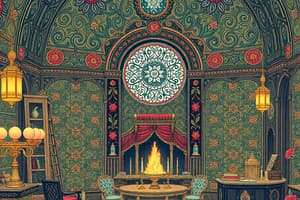Podcast
Questions and Answers
What period is known for the significant changes of the European Renaissance and the Reformation?
What period is known for the significant changes of the European Renaissance and the Reformation?
- Early Modern History (correct)
- Ancient History
- Contemporary History
- Medieval History
Which of the following is NOT a challenge historians face when studying history?
Which of the following is NOT a challenge historians face when studying history?
- Bias and Interpretation
- Influence of Political Leaders (correct)
- Limited Sources
- Bias in Primary Sources
Which aspect is highlighted as an importance of studying history?
Which aspect is highlighted as an importance of studying history?
- Developing empathetic understanding (correct)
- Understanding the future
- Focusing solely on politics
- Avoiding critical thinking
What time period is characterized by the rise of industrialization and nationalism?
What time period is characterized by the rise of industrialization and nationalism?
Why is accuracy in historical accounts crucial for historians?
Why is accuracy in historical accounts crucial for historians?
What does political history primarily focus on?
What does political history primarily focus on?
Which method involves original documents or objects from the past?
Which method involves original documents or objects from the past?
What is the primary focus of social history?
What is the primary focus of social history?
Which historical approach evaluates the authenticity and bias of sources?
Which historical approach evaluates the authenticity and bias of sources?
What does economic history study?
What does economic history study?
What is periodization in the context of history?
What is periodization in the context of history?
Which of the following best describes military history?
Which of the following best describes military history?
What does the social construction of the past imply about historical narratives?
What does the social construction of the past imply about historical narratives?
Flashcards
Early Modern History
Early Modern History
A period spanning the 15th to 18th centuries, marked by significant changes like the Renaissance, Reformation, and Age of Exploration.
History
History
The study of past events, using evidence from sources such as written documents, artifacts, and oral accounts.
Contemporary History
Contemporary History
The most recent past, often encompassing ongoing events and encompassing the late 20th and early 21st centuries.
Medieval History
Medieval History
Signup and view all the flashcards
Primary Source
Primary Source
Signup and view all the flashcards
What is History?
What is History?
Signup and view all the flashcards
What is Political History?
What is Political History?
Signup and view all the flashcards
What is Social History?
What is Social History?
Signup and view all the flashcards
What is Economic History?
What is Economic History?
Signup and view all the flashcards
What is Cultural History?
What is Cultural History?
Signup and view all the flashcards
What is Intellectual History?
What is Intellectual History?
Signup and view all the flashcards
What are Primary Sources?
What are Primary Sources?
Signup and view all the flashcards
What are Secondary Sources?
What are Secondary Sources?
Signup and view all the flashcards
Study Notes
Introduction to History
- History is the study of past events, particularly in human affairs.
- It encompasses all aspects of human experience, from political and social structures to cultural developments and technological innovations.
- Historians employ various methods to reconstruct and interpret the past, including the analysis of primary and secondary sources.
Key Themes in History
- Political History: Focuses on the development of governments, political systems, and interactions between nations or groups.
- Social History: Examines the lives, experiences, and interactions of people in various social groups, including classes, ethnicities, and gender.
- Economic History: Studies economic systems, trade, production methods, and the development of wealth and poverty throughout time.
- Cultural History: Explores the arts, beliefs, traditions, values, and everyday life of different societies and cultures.
- Intellectual History: Investigates the evolution of ideas, philosophies, and intellectual movements.
- Military History: Examines conflicts, warfare, and strategies throughout human history.
Historical Methods and Approaches
- Primary Sources: Original documents or objects from the past, such as letters, diaries, artifacts, and photographs.
- Secondary Sources: Analyses and interpretations of primary sources, produced by historians or scholars.
- Historical Criticism: A set of techniques for evaluating sources, including authenticity, contextualization, and bias.
- Narrative History: Tells a story about the past, often through a chronological framework.
- Comparative History: Examines similarities and differences between different societies and periods across the world.
- Thematic History: Focuses on specific themes or issues, such as the impact of technology or the role of women, across different periods and places.
- Social Construction of the Past: Recognizes that historical narratives are influenced by the values, perspectives, and biases of the historians who create them. Historical events are not objective, but interpretations reflect prevailing cultural norms and the historian's own context.
- Periodization: The process of dividing history into distinct periods or eras. This division is often arbitrary and reflects choices made by historians.
Historical Periods
- Prehistory: The period before written records, studied through archaeology.
- Ancient History: Covers early civilizations and empires across different parts of the world, including Egypt, Mesopotamia, Greece, and Rome.
- Medieval History: Often associated with Europe, but encompasses broader regions, spanning the period between the fall of the Roman Empire and the Renaissance.
- Early Modern History: The period from roughly the 15th to the 18th century, marked by major changes including the European Renaissance, the Reformation, and the Age of Exploration.
- Modern History: The period encompassing the 18th century onward, typically characterized by the rise of industrialization, nationalism, and globalization.
- Contemporary History: The most recent past, often involving ongoing events. Boundaries of this period are fluid and depend on the specific historical context.
Challenges in Studying History
- Bias and Interpretation: Historians' own perspectives and values can influence their interpretations.
- Limited Sources: Historians cannot study all aspects of the past, and some evidence may be lost or distorted.
- Bias in Primary Sources: Personal opinions, cultural views, and political motivations of those who created primary sources can skew the picture of the past.
- Accuracy in Historical Accounts: Historians must be careful in using their sources and avoiding misrepresentation.
Importance of Studying History
- Understanding the past helps us to understand the present.
- Studying history fosters critical thinking and analysis skills.
- History reveals patterns of continuity and change.
- Examining the past allows us to learn from past events and mistakes.
- Recognizing the complexity of the past helps us develop empathy and understanding for different cultures and peoples.
Studying That Suits You
Use AI to generate personalized quizzes and flashcards to suit your learning preferences.



